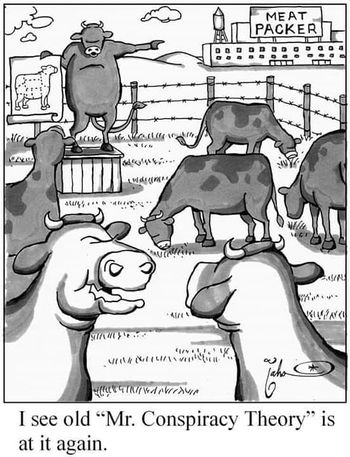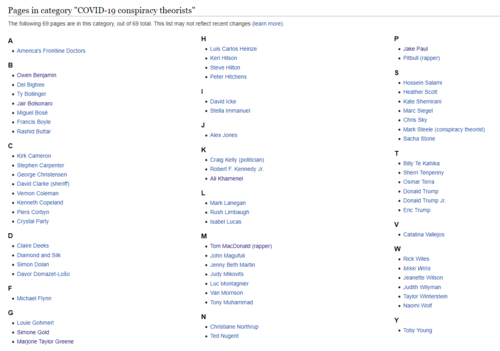Difference between revisions of "Conspiracy mindset"
(correction) |
|||
| (2 intermediate revisions by the same user not shown) | |||
| Line 8: | Line 8: | ||
}} | }} | ||
The '''"conspiracy mindset"''' is a component of [[academic study of conspiracy theories]], a project to equate suspicion of {{on}}s with [[mental illness]]. | The '''"conspiracy mindset"''' is a component of [[academic study of conspiracy theories]], a project to equate suspicion of {{on}}s with [[mental illness]]. | ||
| − | + | {{SMWQ | |
| + | |text=“Conspiracy belief”, “conspiracy thinking”, “conspiracy mindset”, “conspiracy predispositions”, “conspiracist ideation”, “conspiracy ideology”, “conspiracy mentality” and “conspiracy worldview” — most of these apparently serving no distinct purpose other than an attempt at elegant variation — are all terms based upon the [[psychologists]]' own delusional beliefs. For some reason, all those researching the psychology of those they have labelled conspiracy theorist imagine, without reason, that the so-named “[[conspiracists]]” don’t have any evidence to back up their arguments. | ||
| + | |date=1 August 2022 | ||
| + | |source_URL=https://www.ukcolumn.org/article/the-bbcs-psychology-behind-conspiracy-theories | ||
| + | |source_name=UK Column | ||
| + | |subjects=Conspiracy mindset, Conspiracy theorist, Conspiracy theory/Academic research | ||
| + | |authors=Iain Davis | ||
| + | }} | ||
==Official narrative== | ==Official narrative== | ||
Western democracies may occasionally deceive people, but the existence of a "[[free press]]" makes it is impossible that this could be anything more than an isolated few [[bad apples]]. Widespread systemic corruption is unthinkable. | Western democracies may occasionally deceive people, but the existence of a "[[free press]]" makes it is impossible that this could be anything more than an isolated few [[bad apples]]. Widespread systemic corruption is unthinkable. | ||
| Line 38: | Line 45: | ||
==Taking conspiracy seriously== | ==Taking conspiracy seriously== | ||
| − | It | + | It is taboo for research into "conspiracy theory" to review the available evidence for such beliefs, or even reflect on its presence or absence.<ref>https://www.ukcolumn.org/article/the-bbcs-psychology-behind-conspiracy-theories</ref> |
| + | |||
| + | There are however a few authors who have published academic papers which ''look at the evidence of conspiracies'' (for example [[Amy Baker Benjamin]], [[Lance deHaven-Smith]] or [[Peter Dale Scott]]). | ||
==Purposes== | ==Purposes== | ||
Latest revision as of 18:36, 14 August 2022
(Cover up, mentality) | |
|---|---|
 | |
| A tool of the deep state to undermine opposition. Anyone who believes in high level corruption (holds "conspiracy beliefs") is assumed to be mentally abnormal and deficient, although the majority of the population do so. |
The "conspiracy mindset" is a component of academic study of conspiracy theories, a project to equate suspicion of official narratives with mental illness.
““Conspiracy belief”, “conspiracy thinking”, “conspiracy mindset”, “conspiracy predispositions”, “conspiracist ideation”, “conspiracy ideology”, “conspiracy mentality” and “conspiracy worldview” — most of these apparently serving no distinct purpose other than an attempt at elegant variation — are all terms based upon the psychologists' own delusional beliefs. For some reason, all those researching the psychology of those they have labelled conspiracy theorist imagine, without reason, that the so-named “conspiracists” don’t have any evidence to back up their arguments.”
Iain Davis (1 August 2022) [1]
Contents
Official narrative
Western democracies may occasionally deceive people, but the existence of a "free press" makes it is impossible that this could be anything more than an isolated few bad apples. Widespread systemic corruption is unthinkable.
Psychological profiling
Many papers hypothesise the existence of a "conspiratorial mindset" and then attempt to characterise it.[2]
"Need for cognitive closure"
A 2017 paper stated that
“Conspiracy theories offer simple answers to complex problems by providing explanations for uncertain situations. Thus, they should be attractive to individuals who are intolerant of uncertainty and seek cognitive closure.”
Marta Marchlewska, Aleksandra Cichocka, Małgorzata Kossowska (2017) Addicted to answers: Need for cognitive closure and the endorsement of conspiracy beliefs [3]
Self contradictory nature
Roland Imhoff and Pia Karoline Lamberty argue that “a small part in motivating the endorsement of such seemingly irrational beliefs is the desire to stick out from the crowd, the need for uniqueness” [2]
Taking conspiracy seriously
It is taboo for research into "conspiracy theory" to review the available evidence for such beliefs, or even reflect on its presence or absence.[4]
There are however a few authors who have published academic papers which look at the evidence of conspiracies (for example Amy Baker Benjamin, Lance deHaven-Smith or Peter Dale Scott).
Purposes
The stigmatisation of those who doubt official pronouncements is accompanied by growing efforts to censor their self-expression on the internet. Like with Drapetomanie before, thinking and reason as human reaction to observations is branded and "outlawed".
Covid-19
An article from Bruce L. Miller, a neurologist, speaks of “neuropsychological impairments” in people with dementia and then leads over to those who believe things that are against science and who exhibit antimask behaviour while may also having antivaccine beliefs.[5][6]
The relationship between antiscience viewpoints and low science literacy underscores new findings regarding the brain mechanisms that form and maintain false beliefs.

Usage
The phrase "conspiracy mindset" is used outside of an academic context, sometimes with an awareness that it is a new term.[7]
Related Quotations
| Page | Quote | Author | Date |
|---|---|---|---|
| Marie-Eve Carignan | “Early findings show that there really is a rapid uptake of different conspiracy theories, particularly in the United States and France. Similar theories about other diseases that took years to establish themselves only took a few weeks to take hold, super quickly, because people are absorbing so much information! That’s what’s alarming.” | Marie-Eve Carignan | 5 April 2020 |
| Totalitarianism | “the mind of the conspiracy theorist can hardly be changed, and surely not on mere logical grounds. These two elements, namely the ideation of hidden plots behind social events and the suspiciousness with which alternative accounts are regarded, have prompted historians to define conspiracy thinking as a form of collective paranoia.” | Bruno Castanho Silva Federico Vegetti Levente Littvay | 2017 |
References
- ↑ https://www.ukcolumn.org/article/the-bbcs-psychology-behind-conspiracy-theories UK Column
- ↑ a b Too special to be duped: Need for uniqueness motivates conspiracy beliefs , 2016
- ↑ http://dx.doi.org/10.1002/ejsp.2308
- ↑ https://www.ukcolumn.org/article/the-bbcs-psychology-behind-conspiracy-theories
- ↑ https://www.rt.com/op-ed/507210-unscientific-paper-pathologize-dissent-miller/
- ↑ https://jamanetwork.com/journals/jama/fullarticle/2772693
- ↑ https://www.intentional-conservative.com/conspiracy-theory-is-not-christian/